|
|
|
Sort Order |
|
|
|
Items / Page
|
|
|
|
|
|
|
| Srl | Item |
| 1 |
ID:
149441
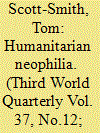

|
|
|
|
|
| Summary/Abstract |
This paper critically examines the ‘humanitarian innovation’ movement, arguing that it represents a departure from classical principles and the entry of a distinctive new ideology into the sector. Labelling this ‘humanitarian neophilia’, the paper argues that it has resonances of Barbrook and Cameron’s ‘Californian Ideology’, with its merging of New Left and New Right within the environs of Silicon Valley. Humanitarian neophilia, similarly, comes from a diverse ideological heritage, combining an optimistic faith in the possibilities of technology with a commitment to the power of markets. It both ‘understates the state’ and ‘overstates the object’, promoting a vision of self-reliant subjects rather than strong nation-states realising substantive socioeconomic rights.
|
|
|
|
|
|
|
|
|
|
|
|
|
|
|
|
| 2 |
ID:
168479
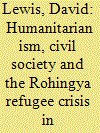

|
|
|
|
|
| Summary/Abstract |
This paper reflects on responses to Bangladesh’s Rohingya refugee crisis in the weeks that followed the increased numbers of Rohingya refugees who arrived from Myanmar after 24 August 2017. Drawing on literature on the local and international dimensions of humanitarianism, and the analytical lens of performance, it explores narratives of helping in relation to the shifting character of Bangladesh’s civil society, changing expressions of local and international religious sentiments, and the importance of understanding both formal and informal responses historically in the context of Bangladesh’s own experiences as a country born from a crisis in which citizens became refugees fleeing state-sponsored violence.
|
|
|
|
|
|
|
|
|
|
|
|
|
|
|
|
| 3 |
ID:
154796
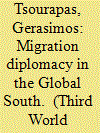

|
|
|
|
|
| Summary/Abstract |
Despite a recent resurgence in research on the politics of migration, foreign policy analysts have yet to approach cross-border population mobility as a distinct field of inquiry. Particularly within the Global South, scant work has theorised the interplay between migration and interstate bargaining. This article proposes the framework of migration diplomacy to examine how mobility features in states’ issue-linkage strategies, in both cooperative and coercive contexts. Drawing on Arabic, French and English primary sources, it empirically demonstrates the salience of its framework through an analysis of Libya’s migration diplomacy towards its Arab, African and European neighbours under Muammar Gaddafi.
|
|
|
|
|
|
|
|
|
|
|
|
|
|
|
|
| 4 |
ID:
163050


|
|
|
|
|
| Summary/Abstract |
This article provides a critical examination of the current extensive promotion of ‘self-reliance’ for refugees. The existing scholarship largely ignores the unsuccessful historical record of international assistance to foster refugees’ self-reliance and fails to discuss its problematic linkages to neoliberalism and the notion of ‘dependency’. The article reveals that the current conceptualisation and practice of self-reliance are largely shaped by the priorities of international donors that aim to create cost-effective exit strategies from long-term refugee populations. The authors argue that where uncritically interpreted and applied, the promotion of self-reliance can result in unintended and undesirable consequences for refugees’ well-being and protection.
|
|
|
|
|
|
|
|
|
|
|
|
|
|
|
|
| 5 |
ID:
154483
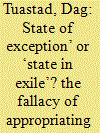

|
|
|
|
|
| Summary/Abstract |
To refer to Palestinian refugee camps as states of exception, appropriating the paradigm of Giorgio Agamben, is definitely tempting. Agamben argues that in times of crisis, individual rights of citizens are diminished and entire categories of people kept outside the political system. Nevertheless, there are flaws in applying Agamben’s perspective on Palestinian camps. It acquits the camp residents from the autonomy over their own political agency. Historically, in Lebanon, camp residents experienced an almost limitless access to free political organisation. But this access has not been converted into the development of representative, legitimate political structures.
|
|
|
|
|
|
|
|
|
|
|
|
|
|
|
|
| 6 |
ID:
158918


|
|
|
|
|
| Summary/Abstract |
This article critically analyses the representational practices of serious (video) games that focus on refugees. It argues that the technological form of serious games can simulate the historical, political and socio-economic factors that shape why refugees leave their home country and their experiences when travelling to host countries. They are able to mobilise intellectual agendas which challenge the de-contextualised representations of refugees typical in traditional media. As such, they challenge players to critically reflect on the complexities of refugee experiences and politics, thereby presenting a potential to move away from grand emotional discourses of pity and compassion.
|
|
|
|
|
|
|
|
|
|
|
|
|
|
|
|
| 7 |
ID:
171925
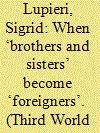

|
|
|
|
|
| Summary/Abstract |
Does overseas development aid necessarily translate into more generous national policies for refugees? Evidence from Jordan suggests that this is not always the case. Since the arrival of an estimated 756,000 Syrian refugees, international funding has made Jordan one of the top seven recipients of foreign aid in the world. Despite sustained international financing, however, national policies towards refugees have become increasingly restrictive, especially when it comes to healthcare. Based on fieldwork conducted between 2017 and 2019, this paper argues that Jordan’s healthcare policies towards Syrian refugees are not necessarily correlated to international financing, but are rather the product of political considerations aimed at maintaining domestic stability, increasing bargaining power in the global policymaking arena and resisting international pressures to integrate Syrian refugees. This paper contributes to filling a gap in the literature on the complex and interdependent factors which influence the evolution of national healthcare policies towards refugees in a country not only highly dependent on foreign aid, but also at the geopolitical crossroads of international interests in the Middle East.
|
|
|
|
|
|
|
|
|
|
|
|
|
|
|
|
|
|
|
|
|